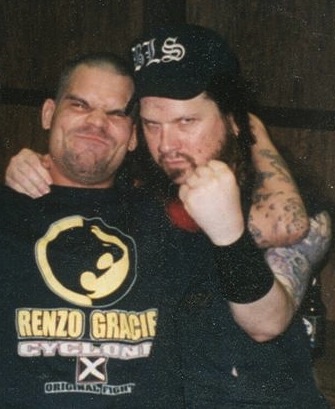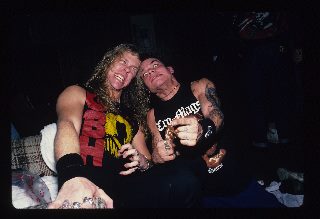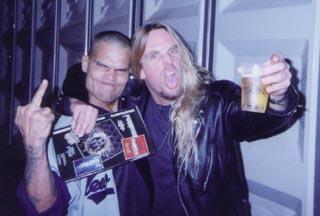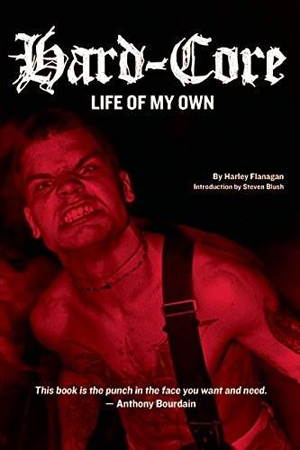Harley Flanagan has been an integral part of the New York City hardcore scene since before anyone really knew what it meant to be hardcore. He was playing the international punk circuit at an age when most kids havenít decided what instrument they want to play or if theyíre even going to play one at all. It wasnít easy, though, and it came at a price. Flanagan has lived a hard life, very much tied to the ups and downs that New York itself has gone through over the past 40 years since he started out.
The worst came in 2012 at Webster Hall when he was involved in an altercation with members of his former band the CRO-MAGS. Violence erupted and Flanagan found himself jailed and facing serious charges. Eventually, the charges were dropped, and thankfully, the incident is now behind him. Flanagan has evolved a great deal over the years and found positive ways to share the lessons heís learned from both his success and from the difficulties heís faced.
Thereís much to his story and heís recently released a solo album Cro-Mags, which layers the details of the Webster Hall incident over Flanaganís signature hardcore sound. He also has a book coming out soon entitled Hard-Core, Life Of My Own. It not only tells the story of Flanaganís life experiences, it does so in a manner that relays the history of NYC as seen through his eyes growing up there and being a fixture in the punk and hardcore scenes.
I had a chance to chat with Harley Flanagan about everything heís got going on right now. Hereís what he had to say.
KNAC.COM: Although youíre an accomplished bassist well known for your work with the CRO-MAGS, you started out as the drummer with the STIMULATORS at age 10. When did you begin playing and who are some of your influences musically?
FLANAGAN: Iíve been playing as long as I can remember. I was actually in my first punk band before the STIMULATORS over in Europe (Denmark). Some people are just born with that impulse. Iíve always done drawings and other types of art, too. Most people thought I was going to be a cartoonist or an artist before I started pursuing music. I think of it almost like a mental disorder. There are times when I have riffs coming out of my head such that I literally canít get to sleep at night. I need to figure out how the riff goes, what the chord progression or time signature is. As a drummer, I get really caught up in time signatures. Sometimes Iíll drive myself crazy sitting with an instrument trying to figure out some progression in my head. Itís fun, but it can also be totally nerve-racking.
 Iíve always had a pretty open mind about music and started listening to it when I was really young. My mother took me with her to shows and concerts, so Iíve been around music my whole life. My aunt played with a lot of people, too. She was friends with Bob Dylan and jammed with Link Wray and a lot of famous players from back in the day before the punk rock thing happened. It was she who started the STIMULATORS, which I eventually joined.
Iíve always had a pretty open mind about music and started listening to it when I was really young. My mother took me with her to shows and concerts, so Iíve been around music my whole life. My aunt played with a lot of people, too. She was friends with Bob Dylan and jammed with Link Wray and a lot of famous players from back in the day before the punk rock thing happened. It was she who started the STIMULATORS, which I eventually joined.
My grandfather was a classical pianist and played clarinet and flute in the military. My father even played a bit of bluesy guitar. I donít know if itís possible to have a genetic predisposition for being musically inclined, but music has definitely always been a part of me.
KNAC.COM: After your departure from the CRO-MAGS came the widely publicized incident at Webster Hall in 2012 involving Michael Couls, William Bernardo Jr. and you. What led up to it and is it all behind you now?
FLANAGAN: Really, what led up to it was a bit of my own stupidity. I thought that if I went to that show and saw John (Joseph) and Mackie (Jayson) I might actually get a warm welcome after the initial shock of seeing me. Iíve known them both for so long, since we were kids. I believed in my heart-of-hearts that if I saw John face-to-face, weíd be able to laugh it off like weíd done so many times in the past. It seemed possible without all of the negative input from outside influences who arenít even part of the original band, especially given all of the ups, downs and arguments weíd been through before. I really thought I might actually end up going up there and playing a few songs with them. I didnít have any delusions about showing up and it turning into a spontaneous CRO-MAG reunion, but I did think that if I extended my hand to him that he would feel some sort of obligation to do the same. For me, it just seemed like the right thing to do. Enough time had passed. Evidently, he didnít feel that way and there were a lot of other forces at work, as well. Things turned out the way they did.
I got jumped. It seems like a setup when you look at all of the evidence and how it went down. Iím not going to dwell on it. Itís in the past. At the time, it weighed heavily on my mind and was all I could think about. I got arrested and was charged with attacking a room full of people. It doesnít even sound right to suggest that I, by myself, would go to a show where John was playing, would be surrounded by all of his friends, band members, security and bouncers, and attack them. So, yeah! I got arrested, went to Rikers, and was looking at doing a considerable amount of time for something I didnít even do or intend to instigate on any level.
Thatís what came out when I was writing the album Cro-Mags. I was writing some of its songs when I was in Rikers, which is why there are lyrics like, ďsitting in a cell in Rikers Island reading about myself in the New York Post.Ē Thatís literally what I was doing. Itís like a time capsule. If anything, Iíve always likened hardcore to the last real connection to American folk music or blues because itís like storytelling. My story has always been real. Iíve told my life stories and experiences. Thatís what sets me apart from other bands that basically talk a lot of shit. They make up stories, fabricate stuff, create fake histories, and a lot of hyped-up bullshit. I wrote from the heart and from actual experiences. Thatís one of the things that gives my music integrity. Not just the riffs, but also the story and the message.
Thatís where I was when I wrote Cro-Mags and Iím in a much better place now. I canít tell you what the lyrics of my next record will be about, but I know the songs are going to be crushing. Iíve already got eight of them written and theyíre some of the strongest sounds Iíve yet written.
 KNAC.COM: Youíve talked a bit about how your 2016 solo release Cro-Mags takes listeners on a chronological journey through your thoughts and emotions as you went through the personal and legal struggle with your former band. Was this album a way of getting the whole thing out on the table both in terms of the story and as a commentary about peopleís opinions and the system as a whole?
KNAC.COM: Youíve talked a bit about how your 2016 solo release Cro-Mags takes listeners on a chronological journey through your thoughts and emotions as you went through the personal and legal struggle with your former band. Was this album a way of getting the whole thing out on the table both in terms of the story and as a commentary about peopleís opinions and the system as a whole?
FLANAGAN: Oh, absolutely. I poured them all into it. One person asked me if I had to dig deep to get there. No, not at all! That shit was right on the surface. I couldnít turn away from it. I was all over the Internet, news and the papers. Everybody I knew was talking shit and lying about me. Thatís some heavy shit, when your own people turn on you, take your head off, and try to discredit and screw you publicly. Itís like, ĎWow!í But, you know what? Itís all good. When all of this went down I got to see who really had my back. I cut loose a lot of baggage, dead weight. Iíve rebuilt my life since and itís so much better than it ever had been. People like Renzo Gracie came to my aid and Iíve had other people come into my life who Iíd have never imagined. Iím okay with the number of people I cut loose because Iíve gained so much more through this process and Iím in a much better place. Things have a way of working out.
KNAC.COM: To your point, thereís a song on the album ďTo All My FriendsĒ where you actually give a shout out to those who stood by you through your whole ordeal.
FLANAGAN: Oh, absolutely. Sean Kilkenny, in particular, played on that song, who I love to death and has been playing with me for a long time. At the same time, itís a bit tongue-in-cheek. It was also like, ĎThis goes out to all of my so-called friends; all of you who said you were my friends, my boys, my bros and would always be there for me.í A lot of them turned their backs, but the few who didnít, I got to see who they were. Theyíre way more important than all of the fair weather friends and all of those who are ghosts when you really need them.
KNAC.COM: Although youíre an accomplished drummer, you brought in Pablo Silva on drums for Cro-Mags as well as guitarists Pete Thompson, Gabriel Abularach and Albert Romano. Was writing this a collaborative process or did you write all of the material prior to bringing the others in to record?
FLANAGAN: I actually recorded it all first on acoustic guitar to a click track, and then I gave those songs to everyone else. We basically went into the studio and recreated the rest of the tracks over a lot of that stuff. I did a few demos with me playing the drums, but Pablo is just a far superior drummer. He comes from a jazz background. He went to Berklee and heís just badass. Iíd be a fool to not have him and the others guys come in and play on the album.
I did the demoing and wrote the music, but was really lucky. I met the engineer who coproduced it with me. He had a studio. It was a great chain of events. I look forward to getting into the studio next time and having it be a bit more rehearsed and practiced first, but this turned out really well under all of the circumstances.
 KNAC.COM: You have a book coming out this September entitled Hard-Core, Life Of My Own. Having been a fixture in the NYC punk and hardcore scenes since the late Ď70s, experiencing the highs and lows that go along with success, and working with other noted and influential artists along the way, what can readers expect from this very honest autobiographical tale about your life thus far?
KNAC.COM: You have a book coming out this September entitled Hard-Core, Life Of My Own. Having been a fixture in the NYC punk and hardcore scenes since the late Ď70s, experiencing the highs and lows that go along with success, and working with other noted and influential artists along the way, what can readers expect from this very honest autobiographical tale about your life thus far?
FLANAGAN: People have a lot of misconceptions about me, but all I did was tell my story. That story goes through the various stages of the New York punk/hardcore/crossover experience in which I was involved. Obviously, it covers CRO-MAGS, the rise and fall of the band. But thatís not what itís about. Itís about my life. It talks about Webster Hall and my take on what went down there. The book takes the reader step-by-step through that day, when I went to the show, what I saw, when I first got hit, everything.
New York City and its history are a big part of this book, as well. Itís not just about my life, but also my experiences in this city and growing up in it. Everything from the black outs to the Son of Sam. You name it. Anthony Bourdain said it was a great read and that he read it in one sitting. That told me it turned out much better than Iíd originally thought.
KNAC.COM: Having been in the punk and hardcore scene since its early days, do you hear your influence in current bands, and if so, which ones?
FLANAGAN: In all honesty, Iíve only heard a couple of things and itís been accidental. I hope this doesnít sound wrong, but I try not to listen to very much current stuff. I donít want to accidentally start copying someone elseís vibe or feel, or subconsciously borrowing other peopleís riffs because theyíre new influences. I have so much going on in my head musically and Iím always listening to and exploring music, but not too much hardcore/metal/crossover. I do listen to the same old favorites regularly. Not a day goes by when I donít end up listening to BAD BRAINS, BLACK FLAG, all of the stuff I grew up with. Thatís just a part of my history, my taste and my influences.
KNAC.COM: Something people may not realize is that you have a black belt in Jiu-jitsu and are an instructor at the Renzo Gracie Academy in NYC. How did you first get involved in martial arts and, given your hardcore persona, are people surprised to find that your teach marital arts to kids?
FLANAGAN: I wouldnít say that punk/hardcore music is a way of getting out that side of my personality. It was more a part of what created it. Itís definitely not put on. If anything, where I am now is just part of my evolution. I earned my black belt competing, training and fighting. Iíve been a fighter my whole life and you reach a point when youíve fought so much that you make peace with it. Itís incredibly rewarding to be able to share what Iíve learned from my struggles in a positive way and to see the smiles on my studentsí faces. I teach adults, MMA fighters and even kids with various spectrum disorders. Seeing the confidence they acquire and seeing them move from one level to the next becoming more coordinated makes me feel like Iím turning everything I went through into something positive.
I still play the music that Iím into because thatís what feels good to me. I play all kinds of music doodling around on my acoustic guitar and bass, but in order to feel as though I really put out I need to play that hard stuff. Thereís no difference between me doing Jiu-jitsu and that. Itís all part of who I am. People are more complicated than they allow themselves to realize.
 When people see my stage persona, thereís a reason that person is scary. Unlike many of the bands that put on that image, I might be a little scary because of what Iíve actually been through. That doesnít mean that Iím a scary person. Itís just that Iíve had a hard life. Itís not some Gene Simmons makeup or some shit like that. Iím not someone with tattoos on my neck coming from the suburbs whoís never had a struggle in my life. Iím real; it comes through and thatís why thereís integrity in my music. Thatís also probably why Iíve never been all that successful. Itís usually the fakes who make all of the money, so there you go.
When people see my stage persona, thereís a reason that person is scary. Unlike many of the bands that put on that image, I might be a little scary because of what Iíve actually been through. That doesnít mean that Iím a scary person. Itís just that Iíve had a hard life. Itís not some Gene Simmons makeup or some shit like that. Iím not someone with tattoos on my neck coming from the suburbs whoís never had a struggle in my life. Iím real; it comes through and thatís why thereís integrity in my music. Thatís also probably why Iíve never been all that successful. Itís usually the fakes who make all of the money, so there you go.
Youíve got to be yourself, though. Thatís why I gravitated toward punk rock in the Ď70s and was part of instigating the hardcore movement out of punk later that decade. For me, itís always been about realness. What never appealed to me about metal, KISS and the rest of those bands that other kids were listening to was their fakeness. I didnít connect to that. Rather, I connected to something that represented the urban struggle and rebellion because thatís what I was living. Thatís what I identified with. Even though Iím doing much better now and married a woman whoís doing great, thatís still engrained in me and will always be a part of who I am. No matter how refined I may appear, there are still calluses on these hands.
KNAC.COM: After having come so far musically and in your personal life in addition to becoming an integral part of the New York City hardcore scene, what do you want your fans to know most about you?
FLANAGAN: My story, the whole story, itís all in my book Hard-Core, Life Of My Own. I hope people will pick it up, read it and check out my website www.harleyflanagan.com. There are a lot of great photos, stories and music posted on the site. I just really appreciate everyoneís support and interest.
KNAC.COM: What are you plans for taking the new album out on the road?
FLANAGAN: Well, there have been some offers, but I work six days a week. Everyone in my band works, too. Theyíve got to be the right gigs in order for us to do it. That doesnít mean Iím not interested in going out. I love playing. I play every day and the band jams pretty often. Itís definitely going to happen, but realistically it probably wonít happen until after the book is released. Iíve coordinated some shows to coincide with the book tour, so that I can do book stuff during the day and play shows in the same cities in the evenings.
Harley Flanagan is a multidimensional man who has evolved very much in keeping with both his taste in music and the city he calls home. True to his roots, he remains hardcore and completely real. Added to that, thereís a layer of being at peace with who he is, where heís been and where heís going. The turmoil that once reigned has been replaced with a focus on directing the lessons born of his struggles in a more positive direction. To be sure, there are still places in NYC that remain scary, but nowadays one feels safe in Times Square regardless of the hour.




